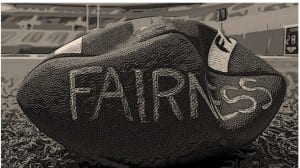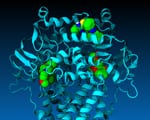Definitions and standards for what constitutes cheating vs. fairness have never been so needed or consequential. — Weyand
SMU physiologist and biomechanics researcher Peter G. Weyand contributed a piece on cheating in sports to the U.S. online news magazine and blog the Huffington Post.
The piece addresses how modern cheating controversies in sports indicate the need for a new approach to judge fairness that encompasses a broader range of possibilities.
Weyand leads the SMU Locomotor Performance Laboratory and is recognized worldwide as an expert in human running performance.
An expert in the locomotion of humans and other terrestrial animals, Weyand’s broad research interests focus on the relationships between muscle function, metabolic energy expenditure, whole body mechanics and performance.
Weyand’s Huffington Post article, “Cheating in Sports — Where Do We Go From Here?” published Sept. 14, 2015.
EXCERPT:
By Peter Weyand
in the Huffington Post
“I can’t define it, but I know it when I see it.” — U.S. Supreme Court Chief Justice Potter Stewart on pornography in Jacobellis v. Ohio, 1964Consider some of the current controversies in organized sport: football inflation pressures, “flopping” and “diving” to deceive basketball and soccer officials, performance-enhancing drug (PEDs) cases, possible techno-doping via streamlined suits and artificial limbs, and the potential for genetic doping.
These and other contemporary issues pose unprecedented challenges to the integrity of organized sport. Accordingly, definitions and standards for what constitutes cheating vs. fairness have never been so needed or consequential.
History provides us with clear instances of cheating in sport: Chicago’s “Black Sox” conspiring to intentionally lose baseball games in the 1919 World Series, pitcher Gaylord Perry throwing spitballs in the 1970s, or sprinter Ben Johnson taking banned steroids leading into the 1988 Olympics.
However, many contemporary sport “cheating” controversies simply cannot be evaluated in an equivalently black and white framework.
Consider the ethical dilemmas the following situations pose for modern athletes and athletics: Is it cheating to take a new “designer drug” if: a) it is not banned, b) it enhances performance, and c) many of your competitors take it, and d) you are disadvantaged if you do not?
Is it cheating to fake a fall to induce a referee to call a foul on an opponent?
Is it cheating for an athlete seeking enhanced endurance to sleep in an altitude tent to boost red blood cell production when: a) the practice is not illegal, and b) other athletes do not have the means to do the same.
Is it cheating to use genetic techniques (rather than physical training) to activate dormant portions of one’s DNA to improve muscle performance?
Three of the preceding scenarios presented themselves years ago, the fourth may or may not have yet occurred, but has been a credible threat for some time. All four pose major challenges to the health and integrity of sport.
Yet, while the integrity of sport depends on fairness, the commitment needed to provide it in a viable contemporary form does not seem to be in place. Hence, what is perhaps the greatest threat to both the integrity and health of modern sport – an onslaught of sophisticated techniques to gain advantage by any means possible – is under-recognized, under-resourced and inadequately addressed.
Even a cursory look at the problem makes clear that performance enhancement techniques have raced ahead while standards and policies have not. Athletes and coaches have acknowledged and openly complained that outcomes are unfairly determined by technology rather than ability. Leagues have implemented new policies only to quickly acknowledge they fail to remedy the fairness problems they address (see the NBA’s flopping fines). Instructional videos for inducing foul calls on opponents have been published featuring leading players. “Dirty” athletes, like Lance Armstrong, pass hundreds of doping tests while “clean” athletes are implicated.
Follow SMUResearch.com on twitter at @smuresearch.
SMU is a nationally ranked private university in Dallas founded 100 years ago. Today, SMU enrolls nearly 11,000 students who benefit from the academic opportunities and international reach of seven degree-granting schools. For more information see www.smu.edu.
SMU has an uplink facility located on campus for live TV, radio, or online interviews. To speak with an SMU expert or book an SMU guest in the studio, call SMU News & Communications at 214-768-7650.



 Drugs behave as predicted in computer model of key protein, enabling cancer drug discovery
Drugs behave as predicted in computer model of key protein, enabling cancer drug discovery Researchers discover new drug-like compounds that may improve odds for men battling prostate cancer
Researchers discover new drug-like compounds that may improve odds for men battling prostate cancer Fermilab experiment observes change in neutrinos from one type to another over 500 miles
Fermilab experiment observes change in neutrinos from one type to another over 500 miles $3.78 million awarded by Department of Defense to SMU STEM project for minority students
$3.78 million awarded by Department of Defense to SMU STEM project for minority students Kennewick Man: genome sequence of 8,500-year-old skeleton solves scientific controversy
Kennewick Man: genome sequence of 8,500-year-old skeleton solves scientific controversy At peak fertility, women who desire to maintain body attractiveness report they eat less
At peak fertility, women who desire to maintain body attractiveness report they eat less Physicists tune Large Hadron Collider to find “sweet spot” in high-energy proton smasher
Physicists tune Large Hadron Collider to find “sweet spot” in high-energy proton smasher